- Home
- Linda Newbery
Flightsend Page 8
Flightsend Read online
Page 8
It might be the last day of exams, but the bus was still leaving on time.
‘Bye, then. See you at Lisa’s,’ Charlie called out to two friends who’d be at the party tomorrow; then she made her way as usual to her coach.
No more exams. She slumped in her seat, trying to believe it. She felt like someone coming round from an anaesthetic.
Angus David flumped down in the seat next to hers.
‘What are you doing?’ she asked him.
‘Balancing a beer-bottle on my nose. What’s it look like?’
‘You don’t usually get on this bus,’ Charlie explained patiently.
‘Neither did you, till you moved out to the edges of the known universe. Things change.’
‘Have you moved, as well?’
‘No. Staying with my dad, this weekend and the next fortnight. He’s the one who’s moved, to Long Wykham. Sunny Long Wykham, Gateway to the Shires, famed throughout the East Midlands for its Morris dancers and sheepdog trials. Tomorrow I make my cricketing debut for the Long Wykham team, famous for its demon bowler, Andy Ferris the dairyman. Never underestimate a dairying spin-bowler.’
‘I’ll try not to.’
‘So I’ll be joining you, Charlotte of the flowing tresses.’ Angus bowed, making an extravagant gesture with a twirling hand. ‘I congratulate you on your unexpected luck. Feel free to bask in the glow of my sunny personality and radiant charm.’
‘Well, I would if I were coming on the bus. I won’t be, apart from next Friday and the sixth form days,’ Charlie pointed out.
Angus made a clownish sad face. ‘I know. Terrible timing. Tragic. What a missed opportunity. I shall sit here alone, dreaming of what might have been.’
‘On the bus – why? Are you doing an extra exam, or something?’
‘Since you ask, my melodramatic talents are about to be given full rein.’
‘You’re in the play? A Midsummer Night’s Dream?’ ‘Got it in one. I’m Oberon, King of the Fairies.’ He made a camp gesture.
‘Pretty solid fairy,’ Charlie said, laughing. Stocky, muscular, with hair shaved to stubble, Angus looked like the kind of teenager people crossed the road to avoid. Charlie knew him quite well, and that he wasn’t in the least aggressive. But King of the Fairies – well, it would need someone with his confidence to take that on, in front of half the school.
‘Wait till you see me in my green tights.’ He raised his eyebrows suggestively. ‘You won’t want to miss the theatrical event of the year, will you?’
‘When is it?’
‘Week after next, the same week as sixth form induction. For three nights. Just wait till you see my Titania in all her glory.’ Angus made his eyes go gooey. ‘How am I supposed to keep my mind on the job?’
‘Who is she?’
‘Pippa Woodford. Goddess of the sixth-form. Dream-fodder for the entire male population of the school. Pippa of the name on the walls in all the boys’ bogs.’
‘So that’s why you wanted the part?’ Charlie asked him as the bus pulled out of the gates.
‘You’d think so – but no. It was just the most colossal slice of luck. I’m doing Theatre Studies next year and Ms Bishop talked me into it. That’s why I’ll be the only dummkopf from our year who’s in school every day from now on. Apart from Neil Radetsky – he’s Theseus.’
‘D’you know your lines yet?’
‘Only all the ones I say to Titania. My brain’s full of obscure German vocabulary. It’s an obsession, all this revision. I won’t be able to stop. I won’t feel happy without the periodic table in my pocket, or a list of First World War battles. At least I’ll have something to read if I’m bowled out first ball.’
‘You won’t be,’ Charlie said. ‘You’re one of those sickening people who’s good at everything.’
‘No, I’m not,’ Angus said promptly. ‘I’m rubbish at embroidery, for a start. And you should see me trying to do a double-axel toe-loop. Everything else, yes, OK.’
‘Idiot,’ Charlie said, pretending to hit him. ‘Why are you always so energetic? Most people are wiped out after weeks of exams, but here you are – bounding about like those dogs in adverts. Do you take Bob Martin’s or something?’
‘Every day, with my Pedigree Chum,’ Angus said. ‘I’ll roll over for you to tickle my tummy, if you like. Fancy coming to the cricket tomorrow? We need a few tame females to brew up the tea and do the washing-up.’
‘Tame females – well, look elsewhere. What century do you think this is? Are male cricketers incapable of making tea?’ Charlie retorted. ‘So you’re not going to Lisa’s party, then? Cricket takes up the entire evening when you include the ball-by-ball dissection in the pub afterwards.’ She knew because Sean had sometimes played.
‘That’s right. Can’t miss the post-mortem. Lisa’s party will have to manage without me.’
Soon after Charlie got home, Rowan phoned.
‘You’re still OK for tomorrow night? We’ll come round and pick you up, about half-eight.’
‘We?’
‘Russell, me and Fraser. I told you.’
‘Fraser can give me a lift home, you said. You didn’t say he was taking me there. I’ve asked Mum.’
‘Save her the trouble, can’t you? What’s the problem?’
Charlie was having misgivings about the party, and going with Fraser. She’d forgotten to ask Fay for the evening off, but now realized that she needn’t; if the others weren’t coming till half-past eight, she could do her waitressing first, and leave a bit early.
‘Pick me up at Nightingales, could you?’ she asked Rowan. ‘Not here. It’s the big house round the bend, with the high stone wall.’
‘You’re going there first? But when will you get ready?’ For Rowan, getting ready for a party took up most of the afternoon.
‘Five minutes in the staff loo, that’s all I need.’
‘Charlie, are you kidding?’
Rowan sounded as if she thought Fraser would be getting a poor deal.
Charlie reported for Friday-night duty. ‘What have we got this weekend, then?’ she asked Suzanne, as they set the table.
‘Your art chap again,’ Suzanne said, ‘and Yoga meditation. Spot the Yogi.’
‘They’re going to spend the whole weekend meditating?’
‘I might join them,’ Suzanne said. ‘Jason was ill during the night and I was up three times. I could pretend to meditate but really be fast asleep.’
Charlie saw Oliver Locke in the entrance hall when she went to clear wine glasses. The hall was full of the usual polite chit-chat, Have you just arrived? and What a beautiful spot. Oliver, in the middle of it, caught Charlie’s eye with what looked like relief, and raised his glass.
‘Exams all over! Feeling de-mob happy?’ He came over to her.
‘No, more like numb,’ Charlie said. ‘It’ll take a while to get used to it. What’s your course this time?’
‘Portraiture. I told you. Do you want to join us tomorrow?’
‘I might,’ Charlie said. She had enjoyed painting the self-portrait for her coursework. ‘If you’re sure I won’t be in the way—’
‘Fay!’ Oliver signalled across the room, and Fay broke off her conversation and came over. ‘It’s all right if Charlie joins my group, isn’t it? There’s space for one more, no problem.’
‘Of course. Oh, you two know each other from school?’ Fay was wearing one of her elegant dresses; when there were no visitors around, she wore jeans and a shirt, like Charlie’s mother.
Charlie took advantage of the meeting by saying, ‘Would it be OK if I left a bit early tomorrow night, after we’ve served the coffee? Suzanne and Jon don’t mind. I can make up the time on Sunday.’
‘Saturday night gadding?’ Oliver asked, with a lift of his eyebrows.
‘Lisa Skillet’s having a party to celebrate the end of the exams.’
‘Yes, that’s fine,’ Fay said. ‘I was meaning to ask if you could do some child-minding for me, now you’ve got more ti
me. I thought you might like the extra money. It’d be the odd couple of hours here and there, maybe twice a week. Rosie’s not really much trouble.’
‘Yes, OK.’
‘Could you do Tuesday afternoon, two till four? I’ve got a meeting with one of our sponsors.’
Why, Charlie asked herself afterwards, why did I say yes? How am I going to tell Mum?
She thought of spending time with Rosie, who was only a little older than their own Rose would have been. Rosie always made Charlie think of her lost sister, and yet she was surprised to find that she did want to do it. Wanted to see if she could. Was it like licking a sore tooth? she wondered. Or a more positive step forward – stop pretending that two-year-old children didn’t exist?
She told her mother later that evening: first about the portraiture class, and then, casually, about the child-minding. All Kathy said was, ‘Well, Charlie, we needn’t have worried about you being bored, living here. With the waitressing, and walking Caspar, and the art class and now this –’ Charlie noted the phrasing, the avoidance of words like Rosie or babysitting – ‘there’s not much time for sitting about twiddling your thumbs.’
Charlie was irritated by the phrase twiddling your thumbs. It wasn’t the sort of thing her mother would usually say; and Charlie was annoyed by the implication that she was dull enough to sit about with nothing to do. There was a coolness between them, since the weekend.
In the morning she took her drawing things to Nightingales with her, as well as jeans and a shirt to change into after her breakfast stint. Oliver Locke’s class was held in the Long Barn, an outhouse converted into a studio. It was a large, airy building with windows set into the roof, its agricultural origins shown by the hayloft doors above the entrance and the pitchforks, scythes and other tools mounted on the walls.
Charlie arrived late after clearing up in the kitchen. The other course members – some fifteen of them – were already seated at their easels, around a female model who sat in an upright chair, reading a book. Oliver Locke came over to Charlie, and showed her to an easel.
‘This is Charlie, everyone,’ he announced. ‘You’ve seen her in waitressing garb. She’ll be joining us.’
The others looked at her and smiled, and one or two said Hello. As usual, most were middle-aged or over; Charlie was by far the youngest person in the room. The model was a woman of about forty, wearing glasses, which Charlie thought would be difficult to draw.
She settled at the easel, then set up her sketchpad, took out her 2B pencils and her putty rubber. The atmosphere was silent and serious, everyone concentrating hard. Oliver moved around looking at the drawings, sometimes making a low-voiced comment, sometimes just watching. After a while he sat down and worked on a drawing of his own.
Charlie sketched, rubbed out, frowned, turned a page and started again. She was looking at the model from rather a difficult angle, from the front and slightly to one side, and the woman’s face was foreshortened, tilted down at her book. She drew in the eyebrows and forehead and then went hopelessly wrong with the angle of the glasses. No one else seemed to be having problems; she could see the drawing of the person nearest her, already well into the sheen on the model’s hair and the moulding of her lips. And yet, last week, Oliver had told Charlie that she had more talent than anyone on the course. They must have been a particularly hopeless lot, she thought now.
Discouraged, she looked across to where he sat at his easel. He was sitting to the left of the model, drawing quickly. I’d rather draw him, she thought. His pose was attractive: sitting forward in his seat, his face in profile, concentrated. There was a gracefulness about his movements and she knew she could draw the folds in his shirt and the way the light defined his shoulders. She felt it in her fingers, the urge to work, to commit what she saw to paper. She turned a page and began sketching rapidly: not a portrait but the whole figure. This was easier, much more satisfying. The proportions came out just right, as she knew they would; she had caught the pose.
Then Oliver stood up and went to the person nearest him, making a comment. Charlie went back to her inadequate portrait and tried to sketch in the glasses, her obstacle. Doubt was making her pencil strokes hesitant. She was muffling, and she knew that was no way to draw.
‘You’re having trouble getting started, aren’t you?’ Oliver spoke close behind her. ‘It’s an awkward angle you’ve got. I haven’t helped you much by sitting you here.’
‘It’s the glasses,’ Charlie explained.
She was disappointed that he’d seen how useless she was.
‘Here, let me show you.’ For a second his hand curved over hers. He took the pencil, and before she realized it he’d turned the page and was looking at the drawing of himself.
‘Oh, I – got side-tracked.’ Charlie felt a rush of heat to her face.
But Oliver only laughed, and studied the drawing carefully. ‘Now that’s better. That’s more like your real work. It’s got all the freedom and confidence that’s lacking so far in the portrait. Here, try it like this.’ In a corner of the sheet, he deftly sketched in the model’s forehead, the eyebrows, the glasses. ‘Look at the way the glasses rest on the bridge of the nose. The way the sides of the glasses come out beyond the brow-bone. The angle of the lenses. That’s what you’re not getting yet.’
He moved on, and Charlie tried again, finding it easier. Listening to him talk about the brow-bone, the nose, she felt less embarrassed about the impromptu sketch. To an art teacher, bodies and faces were just objects occupying space, shapes with curves and planes and textures. She worked more steadily now. Next time he came to look, he just nodded approvingly and went on. After a while there was a break for the model, and do-it-yourself coffee made from an urn on the trestle table. People looked at each other’s drawings, and one of the women complimented Charlie on hers.
‘Oh, you’re good. Are you an art student?’
Charlie had thought she might go home at lunchtime, but Oliver clearly expected her to stay all day. When they broke for lunch – just sandwiches and fruit laid out buffet-style in the dining-room – he told her, ‘I’ve brought a book for you. Philip Wilson Steer. Come over to the Well House with me on the way back and I’ll get it for you.’
The Well House was a tiny cottage, close to the Long Barn, usually used for accommodation for one of the tutors; the other had a small flat above the stables. Charlie was curious about the Well House, which was tiny and octagonal, like a garden summerhouse. If there’d ever been a well, there wasn’t one now.
‘I like it here,’ Oliver said, as they walked down the narrow path. ‘It’s well away from everyone. I always ask for the Well House.’
‘Why don’t you go home at night?’ Charlie asked. ‘You must live fairly close?’ She wondered if he were married, or living with someone.
Oliver pulled a key out of his pocket and unlocked the green front door. ‘It’s only temporary, where I’m living. I’m in the middle of what you might call an upheaval. That’s why I’m here so much just now. Fay and Dan are good friends, and I like helping them out.’
‘Are you married?’ Charlie asked.
He looked at her. ‘Not any more.’
He stood back for her to go in first. She was disconcerted to find herself in his bedroom; not that she shouldn’t have known, as it was obvious from the outside that the Well House had only one main room. There was a bed, a desk, flowered curtains at the window, a bookshelf laden with art books. The bed was neatly made, and a pair of his boots stood at the foot. Through a door she could see into a tiny tiled bathroom. Oliver followed her in, leaving the front door open.
‘Here it is.’ He pulled down a glossy book from the shelf. ‘Philip Wilson, your namesake. You can borrow it. Keep it as long as you like.’
She flicked it open, and saw inside the front cover: To Oliver, with love from Rosalind.
‘My ex-wife.’ He saw her reading it.
‘Is she an artist?’
‘No. She’s a librarian.’
<
br /> Charlie wondered about the break-up. Was there another story here of loss, loneliness and rejection? Was Rosalind obstinate and unapproachable, like Mum? She longed to know more, but felt that she’d been blunt enough already.
Oliver looked at his watch. ‘Come on. It’s time to get back.’
Saturday Night
Charlie had had enough of this party. It was nearly one in the morning and she’d have to be up again in six hours’ time. Rowan and Russell had disappeared into one of the bedrooms, and she didn’t want to be the one to disturb them. Fraser Goff, supposedly keen for her to come, had said little to her all evening and was now wrapped round Lisa’s friend Dawn who was wearing what looked like a black nightdress. Charlie’s ex-boyfriend, Stephen Gee, had made a big show of arriving with a glamorous dark girl called Melinda from a different school, and kept looking at Charlie to make sure she’d seen. Charlie hadn’t taken much notice of any of this earlier in the evening, when she’d been laughing and joking with a group who were looking at Lisa’s photos of last year’s ski trip, but by now the party had deteriorated. A second wave – friends of Lisa’s older brother – had arrived after the pub closed, and colonized the kitchen. There was so much dope in the garden that a sweet-smelling drift came in whenever anyone opened the door, and head-thumping music made conversation impossible. Lisa’s parents had gone away for the weekend, leaving Lisa and her brother, Rob, to clear up next day, so there was no reason for the party to end this side of Sunday afternoon. Charlie had fended off a drunken friend of Rob’s who lurched at her in a waft of beer and sweat, and now she wanted to go home.
‘Hey, you know who’s not here, Lisa?’ she heard Dawn saying. ‘Aberdeen Angus!’
‘Oh, Angus is a prat,’ Fraser said. ‘He’ll be rehearsing for the play. You know he’s King of the Fairies? I mean, who else would volunteer for that?’

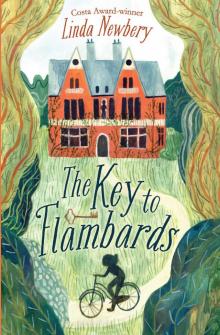 The Key to Flambards
The Key to Flambards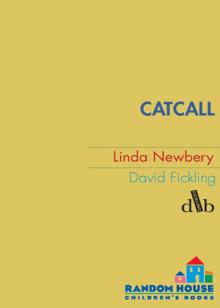 Catcall
Catcall Sisterland
Sisterland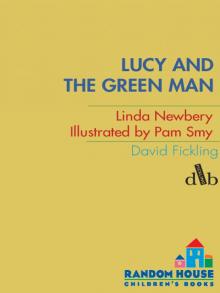 Lucy and the Green Man
Lucy and the Green Man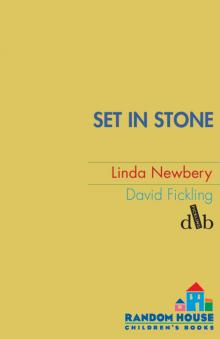 Set In Stone
Set In Stone Lob
Lob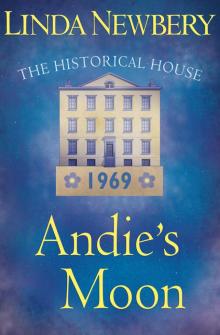 Andie's Moon
Andie's Moon The Shell House
The Shell House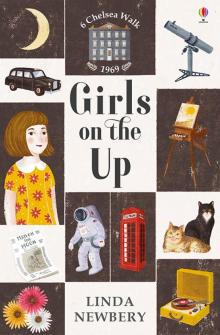 Girls on the Up
Girls on the Up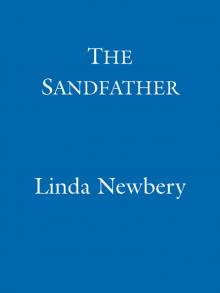 The Sandfather
The Sandfather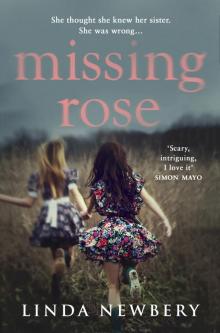 Missing Rose
Missing Rose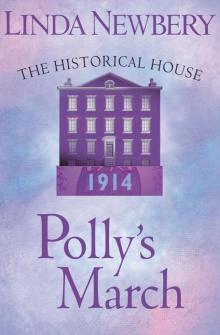 Polly's March
Polly's March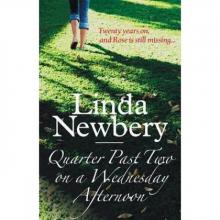 Quarter Past Two on a Wednesday Afternoon
Quarter Past Two on a Wednesday Afternoon Flightsend
Flightsend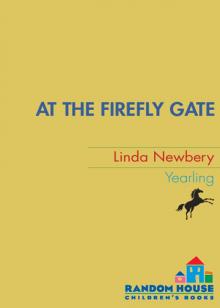 At the Firefly Gate
At the Firefly Gate